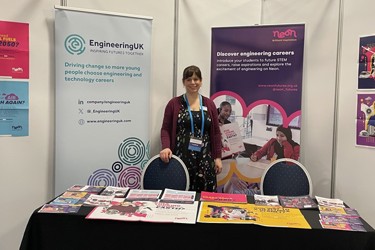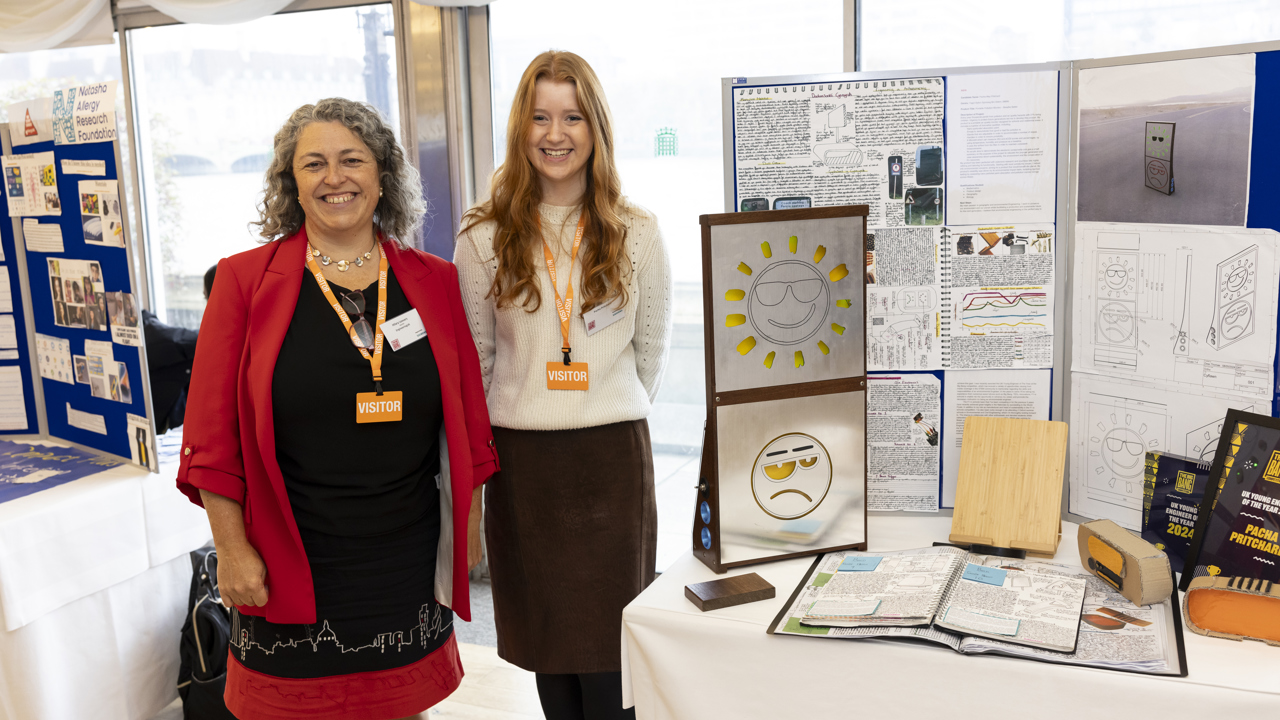Reflections from the National Careers Guidance Show
By Eleanor Eyre, Head of Careers, EngineeringUK
Eleanor attended careers webinars at the National Careers Guidance Show (NCGS) in Leeds to connect with careers professionals and others who are passionate about inspiring young people towards exciting careers in engineering and technology.

I recently had the pleasure of presenting EngineeringUK's work as part of a series of careers webinars at the National Careers Guidance Show (NCGS) in Leeds. It was a fantastic opportunity to connect with careers professionals and others who are passionate about inspiring young people towards exciting careers in engineering and technology.
My talk (called Vocational Learning – Apprenticeships and T Levels in engineering and technology: Routes into the green jobs of the future) focused on how these pathways can equip young people with the skills and knowledge needed to thrive in the green jobs of the future.
We know that engineering employs 6.2 million people in the UK, accounting for almost 20% of jobs. Engineering is set to grow in all UK regions between now and 2030 – faster than other occupations. And engineers will be at the forefront of tackling climate change. Working out how to improve energy efficiency, reduce carbon emissions and do things sustainably will be a big part of their roles.
But our research found that only 55% of school students know what engineers do (48% of girls say they know, compared to 61% of boys). Only 40% know what qualifications they need to become an engineer. On top of this, the number of STEM teachers within state schools has dipped by 5%. Furthermore, engineering related apprenticeship starts have been in an overall trend of decline, and the number of female students taking relevant GCSE and A level subjects is worrying low compared to the number of male students taking these subjects.
Being present at the NCGS highlighted the need for more information and support for students considering Level 1 and 2 qualifications. It's crucial to showcase the wide range of exciting engineering and technology roles available at all levels.
For girls and underrepresented groups, showing them things that have been designed by and for men (such as seatbelts, body armour, construction equipment, smartphones and even the layout of concert venues), demonstrates that they can be part of a much-needed change to make the society we live in one that's designed with everyone in mind.
There is some positive news: In Scotland, Advanced Highers in design and manufacture, and engineering science, have seen large increases in entries, attracting more than double the number of students in 2020-21 compared to 2019-20. Entries into computing A level have increased by 11.3% in the last year, and there's been a 14% increase in the number of students studying engineering and technology since 2009.
The day revealed that there's a need to bridge the information gap. All young people need to know what roles are available, be attracted to them, and then understand the routes in. Young people don’t necessarily need top grades in maths and physics to become an engineer. An aptitude for and interest in these subjects is often a good indication that engineering could be a good option – along with the ability and motivation to come up with creative solutions to problems.
We know that T Levels have the potential to deliver a skilled engineering and technology workforce, but awareness and uptake is low, both in students and employers. Resources such as our All routes into engineering booklet and the T Levels explorer leaflet offer students, teachers and careers leaders valuable guidance.
Career decision-making is influenced by many factors, and research tells us that ‘making a difference’ is one of the top priorities for young people when making these decisions about their future career paths. This is the definition of an engineer! One whose job it is to improve, modify and create things, making the world a better place. Therefore, the engineering workforce of the future needs to represent everyone. We must have diversity of thought as well as the creativity, innovation and insight that comes with it.
The Now and Next report, published by The Careers and Enterprise Company, offers an analysis of careers education in England. It finds that students with the highest ‘career readiness’ were more than twice as likely to have ideas about the industries they want to work in. These were both less likely to be influenced by gender bias (for example, girls were keener to choose engineering) and less likely to be in over-subscribed sectors.
It was great to hear that there's a genuine interest among young people directly from careers leaders. Visitors to our stand highlighted their students, both girls and boys, expressed a strong desire to learn more about careers in engineering and technology. This enthusiasm is the foundation upon which we can build a diverse and skilled future workforce.
Meeting and talking with careers leaders was invaluable. And it was rewarding to see an enthusiastic response to our Neon green careers resources. Schools already using them are taking a positive step to showcase the possibilities within engineering.
We all know that a one-off careers day simply isn't enough. One attendee, who spoke about building a whole-school cross-curricular STEM careers strategy, is spot on. By integrating engineering concepts across various subjects, we can effectively demonstrate its relevance and application to students' lives. We want to work more closely with careers leaders and with STEM Ambassadors who can connect schools with industry role models, especially those from under-represented groups.
The future is green, and the engineering and technology sector is at the heart of that future. By working together, educators, careers professionals, industry leaders, and organisations like EngineeringUK, can inspire and equip the next generation of engineers to build a sustainable tomorrow.




